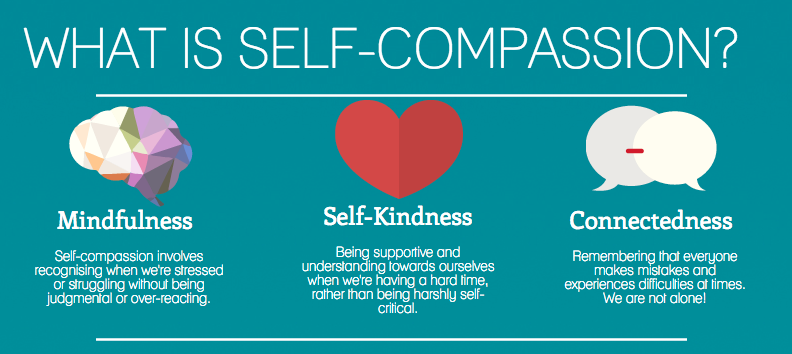Mindfulness Self-Compassion
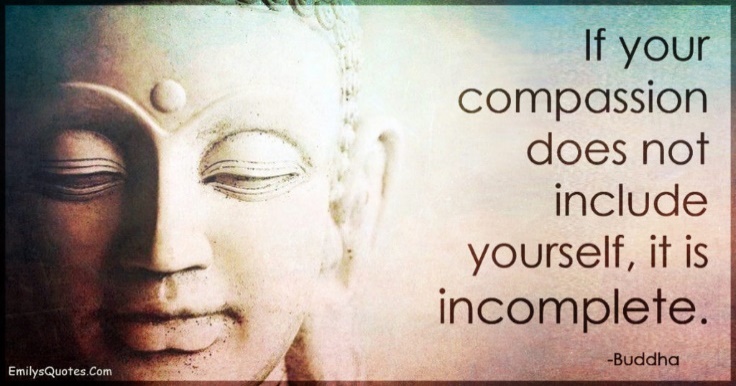
Anyone that knows me, has probably heard me geek-out about how transformational the practice of self-compassion can be….And believe me, it is!
So, what is it?
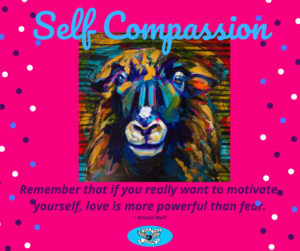
Self-compassion is compassion directed inwards. Self-compassion is the capacity to find the wisdom and dignity in one’s experience (particularly suffering), and to respond to it in a non-judgmental manner that fosters an acceptance of Self. The practice of self-compassion has empirically been shown to reduce anxiety, depression, rumination, negative self-appraisals, and self-harming behaviours including substance misuse, while increasing motivation, wisdom, curiosity and exploration, optimism, initiative and emotional intelligence, as well as acceptance of Self and others (Allen & Leary, 2010; Barnard, 2011; Germer & Neff, 2013; Iskender, 2009; Neff, Kirkpatrick, & Rude, 2006; Peterson, 2013; Van Dam, Sheppard, Forsyth, & Earlywine, 2011). Popova (2016) argues that self-compassion is the most elusive type of compassion, and self-criticism is the most merciless type of criticism. While many school mental health initiatives once focused on bolstering student self-esteem, current research has determined that self-compassion is more crucial to overall well-being, as self-esteem is often derived from feeling superior to others (e.g: “I feel good about myself because I make more money/am a better athlete/ did better on an exam than _______________”). Self-compassion tends to be needed precisely when self-esteem fails by helping to recognize that self-worth is not comprised by being punitively competitive with others.
Such examples illuminate a universal need to practice the tenets of self-compassion. Inspired by the teachings of Buddhist philosophy, operationalized self-compassion consists of three main elements.
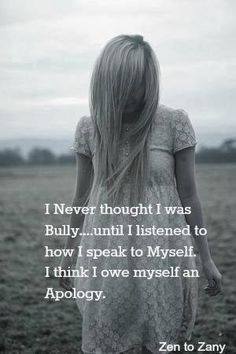
The three elements are:
SELF-KINDNESS (versus self-judgment): Being kind, gentle and understanding with yourself when you are suffering.
COMMON HUMANITY (versus isolation): Realizing that you are not alone in your struggles. When we are struggling, we tend to feel especially isolated. We think we are the only ones to experience loss, make mistakes, feel rejected, or fail. But it is these very struggles that are part of our shared human experience.
MINDFULNESS (versus over-identification): Observing life as it is, without judgment or suppressing your thoughts and feelings.
Easier said than done! Most people don’t think twice about offering loving kindness to others. But how frequently do we treat ourselves lovingly?
Being self-compassionate might seem unnatural at first. These strategies can help.
1. Consider how you would treat someone else. A simple way to do this is to imagine what you would do if someone you cared about came to you after failing at something or feeling rejected. What would you say to them? How would you treat them?
2. Watch your language. You may be so used to criticizing yourself that you don’t even realize that you are doing it, so it helps to pay particular attention to the words you chose to speak about yourself. If you wouldn’t say the same statements to someone you care about, then you are being self-critical.
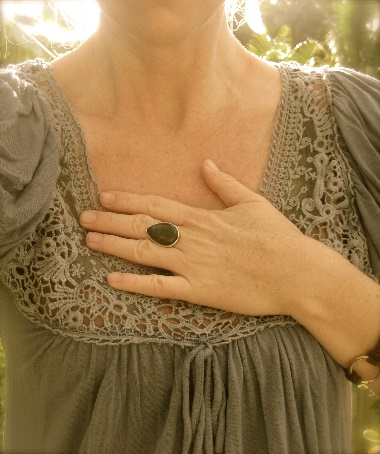
3. Comfort yourself with a physical gesture. Kind physical gestures have an immediate impact on our bodies, activating the soothing parasympathetic system. Physical gestures combined with kind thoughts and words have maximum power to alleviate suffering. One way to give yourself a kind physical gesture is to place your hands over your heart or simply hold your arm. Any soothing gesture will do.
4. Memorize a set of compassionate phrases. Whenever you find yourself saying something like “I’m a total failure”, it helps to have a few phrases ready. Pick statements that resonate with you. Combine that with a physical gesture – like hands over the heart, which is especially powerful. Here are some examples of phrases:

This is a moment of suffering.
Suffering is a part of life.
May I be kind to myself in this moment?
May I give myself the compassion I deserve?
5. Practice guided meditation. Meditation helps to retrain the brain. Meditation is not something to just do in moments in stress; embracing small mindfulness practices can act in preventative ways to reduce the risk of high anxiety and panic attacks from occurring. A beginner mindfulness practice is to sit for just 2 minutes. This may seem ridiculously easy, to just meditate for 2 minutes, but I encourage you to start with just 2 minutes a day for a week. If all goes well, increase by another 2 minutes and do that for a week. This can be part of your new morning routine before work or school. If all goes well, by increasing just a little at a time, you will be meditating for 10 minutes a day in the 2nd month, which will greatly impact your overall well-being and ability to cope with life’s annoyances (let’s face it: you can never eradicate them all).
Make sure you start small first and work your way up to longer periods of time. If you feel anxious while you are meditating, that is completely okay – just notice that without judgment.
* Count your breaths. Once you are comfortable, turn your attention to your breath. Just place the attention on your breath as it comes in, and follow it through your nose all the way down to your lungs. Try counting “one” as you take the first breath in, then “two” as you breath out. Repeat this to the count of ten, and repeat.
* Come back when your mind wanders – and it will!
* Develop a loving attitude towards yourself
*Don’t worry about doing it “wrong” – there is not wrong/right here!
*Don’t worry about clearing your mind
* Notice your surroundings through smell, sound, touch
* Smile when you are done. You are practicing self-care and treating yourself with loving kindness by engaging in this activity!
This may be harder for some individuals, particularly if you have experienced trauma, so it can be important to work with a counsellor – contact me at christine@blacksheepcounselling.com if you’d like support around learning mindfulness self-compassion techniques to increase personal capacity to achieve your preferred way of being. I promise that once you see the power found in the practice of mindfulness self-compassion, you too will join me in geeking out!
Be kind to yourselves,
Christine
